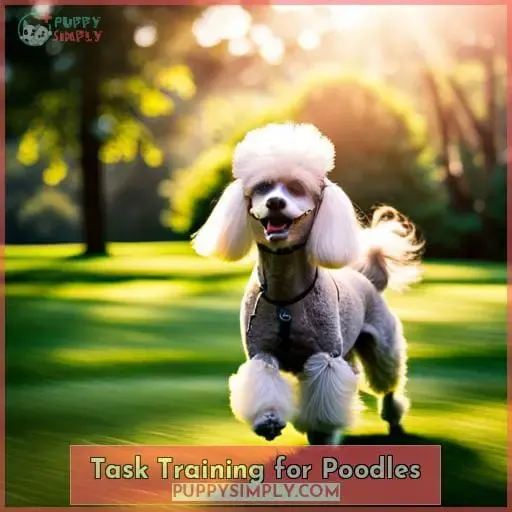This site is supported by our readers. We may earn a commission, at no cost to you, if you purchase through links.
 As a certified trainer, I’m often asked if poodles can be good service dogs. With proper training and matching, their intelligence, low-shedding coats, and eager-to-please attitudes make poodles excellent candidates.
As a certified trainer, I’m often asked if poodles can be good service dogs. With proper training and matching, their intelligence, low-shedding coats, and eager-to-please attitudes make poodles excellent candidates.
However, their sensitive nature presents challenges requiring an experienced trainer. Still, well-bred poodles who form tight bonds can become devoted, adaptable partners meeting diverse assistance needs.
Table Of Contents
- Key Takeaways
- Poodle Suitability as Service Dogs
- Poodle Coat Maintenance
- Poodle Intelligence and Training
- Task Training for Poodles
- Poodle Energy Level and Personality
- Consideration Factors
- Alternatives and Suggestions
- Poodle Training and Characteristics
- Choosing the Right Breeder
- Frequently Asked Questions (FAQs)
- Conclusion
Key Takeaways
- High intelligence and eagerness to please make poodles well-suited for tasks like medical alerting and psychiatric work.
- Poodles form strong bonds with handlers, leading to devotion and adaptability that aids their capabilities as service dogs.
- Their dense coats require regular professional grooming and maintenance.
- Poodles thrive with mental stimulation and varied training approaches that nurture their intelligence.
Poodle Suitability as Service Dogs
Poodle suitability as service dogs depends on their intelligence, trainability, and eagerness to please. These qualities make them excellent candidates for various service tasks such as medical alerting, psychiatric work, and assistance for individuals with disabilities.
However, there are some considerations to keep in mind when considering a poodle as a service dog. Task challenges may arise due to their intense focus during training sessions and the need for varied approaches to keep them engaged.
Additionally, coat care is an important factor since poodles require regular grooming to prevent matting and maintain their hypoallergenic qualities.
If you have concerns about these aspects or are looking for breed alternatives that possess similar sensitivity strengths but have different grooming requirements or temperaments better suited to your needs, it’s crucial to carefully select a reputable breeder specializing in producing well-mannered standard poodles suitable for service work.
Poodle Coat Maintenance
Maintaining a Poodle’s coat requires regular grooming and attention to prevent matting and keep their hypoallergenic fur looking its best.
Here are some key considerations when it comes to poodle coat maintenance:
- Grooming Challenges:
- Poodles have dense, long hair that’s prone to tangling and matting if not properly cared for.
- Regular brushing, bathing, and professional grooming every 6-8 weeks are necessary to keep their coats healthy.
- Poodle coats offer various styling options, from the classic puppy clip or continental clip seen in show dogs to more practical cuts for service work.
- Discuss your preferences with a professional groomer who can recommend suitable styles based on your dog’s needs.
- Poodles are considered hypoallergenic as they shed minimally and produce little dander compared to other breeds.
- However, this doesn’t mean they don’t require regular maintenance; proper grooming ensures minimal shedding and keeps allergens under control.
When considering the cost of owning a poodle as a service dog, it’s important to factor in the ongoing expense of routine grooming appointments – typically costing between $50-100 every 6-8 weeks – along with the purchase price of quality tools such as slicker brushes or dematting tools required for at-home care.
Overall,
regular coat maintenance plays an essential role in ensuring optimal health
and appearance for poodles serving as assistance/service dogs
Poodle Intelligence and Training
As an exceptionally bright breed, you’ll find poodles thrive when challenged mentally. Their high intelligence demands regular cognitive stimulation to prevent boredom or frustration when training service tasks.
Seek innovative ways to keep sessions engaging by increasing complexity or incorporating intelligent disobedience concepts.
Vary repetitive drills and introduce new behaviors to keep your poodle’s mind sharpened.
Puzzle toys, trick training, and obedience courses allow them to problem-solve while having fun.
Keep tasks fresh by interspersing easier instructions with more complex sequences.
Account for your poodle’s need to be stretched cognitively – a mind is a terrible thing to waste, after all.
Clever poodles appreciate inventive handlers who understand the responsibility of nurturing their mental gifts.
Task Training for Poodles
Often, you’re able to excellently train poodles in scent detection, making them quite suitable for medical alerting duties. Their intelligence and eagerness to please enable them to excel in various service tasks.
Poodles possess a unique ability called intelligent disobedience, which allows them to disobey commands when following those commands could put their handler’s safety at risk. This characteristic is particularly valuable when it comes to tasks that require assessing potential dangers or hazards.
Additionally, poodles’ emotional sensitivity makes them well-suited for providing assistance with psychiatric conditions or emotional support needs.
When training poodles for specific tasks, it’s important to consider mobility considerations as they may not have the size and strength required for certain mobility-related work until their joints are fully developed.
Furthermore, due to their independent nature and potentially lower food motivation compared to other breeds, trainers may need unique approaches during task training sessions with poodles.
Poodle Energy Level and Personality
The poodle’s energy level and personality are key factors when considering their suitability as service dogs. After mastering various tasks, we must evaluate if their temperament aligns with service work.
Poodles typically have a medium to high energy level, making them quite active and playful. This can be an asset, as adaptability across different activity levels is crucial for service dogs. However, their energetic nature means positive training methods and outlets for energy are imperative.
- Some poodles exhibit aggression, requiring careful breeding selection.
- Providing regular exercise and mental stimulation prevents behavioral issues from developing.
- Poodles often have a slightly aloof or independent personality which supports their ability to focus during service tasks.
- Their sensitive and emotional nature can be a strength, facilitating an attentiveness to handlers.
- Grooming maintenance can be extensive but their minimal shedding makes poodles suitable for those with allergies.
Consideration Factors
When considering poodles as service dogs, there are several factors to take into account.
- Training challenges may arise due to their intense focus and problem-solving abilities.
- Additionally, coat maintenance should be considered, as regular grooming is necessary for poodles.
- Lastly, it may be helpful to explore alternatives to poodles if their traits or characteristics don’t align with your specific needs or preferences.
Training challenges for poodles
You’ll find poodles can pose some unique training challenges given their intense focus and independent thinking during service tasks.
These behavioral adaptations require specific conditioning methods, such as focus redirection and environmental acclimation. Cognitive engagement is crucial to keep them motivated and prevent boredom. It’s important to address any poodle stereotypes that may hinder their training progress.
Despite these challenges, with proper guidance and consistent training, poodles can excel in various service dog tasks while maintaining their health screening requirements.
| Training Challenges for Poodles |
|---|
| Behavioral Adaptations |
| Conditioning Methods |
| Focus Redirection |
Coat maintenance considerations
Your poodle’s dense, curly coat demands regular professional grooming costing upwards of $100 every couple months.
- Specific tools like slicker brushes and dematting tools
- Multiple styling options from pet clips to full show clips
- Significant financial commitment for lifetime care
Staying on top of coat care ensures your poodle service dog candidate focuses on task training rather than itchy skin or matted fur.
Alternatives to poodles
Several breed alternatives exist if you’re concerned poodles may not be the ideal service dog for you.
| Breed | Service Tasks | Temperament | Sensitivity | Challenges |
|---|---|---|---|---|
| Belgian Malinois | Hearing, mobility | Confident, smart | Medium | Aggression |
| Giant Schnauzer | Vision, psychiatric | Loyal, protective | Medium-high | Stubbornness |
| Bichon Frise | Diabetic alert | Playful, gentle | High | Grooming needs |
Other small breed options like Miniature Poodles or Papillons may suit your needs.
Alternatives and Suggestions
Now that you have considered the factors involved in choosing a poodle as a service dog, it’s time to explore alternative options and suggestions.
While poodles are known for their intelligence and trainability, they may not be the perfect fit for everyone due to concerns such as sensitivity and grooming requirements.
- Explore other breeds:
If you’re looking for a smaller-sized service dog, toy or miniature poodles can be an option. However, there are many other breeds with similar traits that might better suit your needs.
- Consider coat maintenance:
Poodle coats require regular grooming to prevent matting and keep them hypoallergenic. If this is a concern for you or if frequent grooming doesn’t align with your lifestyle, exploring low-maintenance coat options could be beneficial.
3.Training challenges:
While poodles excel in training tasks due to their intelligence, certain aspects like breaking concentration during intense focus can pose challenges during training sessions.
4.Disadvantages of small service dogs:
Keep in mind that small-sized service dogs might face limitations when it comes to mobility tasks compared to larger breeds.
Poodle Training and Characteristics
When training a poodle for service work, it’s crucial to understand their unique characteristics and quirks.
Poodles are often praised for their high intelligence when bred from reputable breeders, making them well-suited for specialized service tasks. However, some lines exhibit strong emotional sensitivity and environmental awareness that serve as strengths when performing psychiatric alert and response work.
Their maturity rate means training for mobility or stability tasks typically can’t begin until around age three when joints are fully developed.
As a certified trainer with experience in multiple breeds, I sometimes see poodles display unexpected quirks like a dislike of being wet or a preference for types of reward.
While predisposed to s쳮d as service dogs given proper breeding and training, their occasionally aloof personality calls for an owner able to embrace their uniqueness.
Selecting a breeder experienced in producing successful working dogs ensures finding a puppy with the ideal temperament.
Choosing the Right Breeder
When selecting a poodle breeder for your prospective service dog, it’s crucial you thoroughly research their reputation, lines, and practices.
Be wary of breeders advertizing therapy dogs without service dog experience or credentials.
To find a quality breeder, consult assistance dog organizations for recommendations of proven programs producing successful working dogs.
Breeder selection criteria.
When choosing where to get your poodle, you’ll want to identify breeders with proven service dogs in their pedigree.
Look for breeders who prioritize breeder ethics, lineage scrutiny, and health testing.
A reputable breeder should emphasize socialization from an early age and conduct temperament assessments to ensure the puppies are well-suited for service work.
By selecting a responsible breeder, you increase the chances of getting a poodle that possesses the necessary qualities for successful service dog training.
Reputable breeder recommendations.
If you want a poodle with the temperament suited for service work, research breeders like Poodles For Service who specialize in producing calm, intelligent dogs.
- Verify health testing certifications for hereditary issues.
- Review client references and testimonials.
- Validate claims of actual service dogs produced.
- Ensure dedication to ethical breeding practices.
False therapy dog claims
Beware of false claims regarding therapy dog status when selecting the right breeder for your poodle. Some breeders may incorrectly claim their poodles are trained as therapy dogs without proper certification.
Owners should research breeder credibility, validate certifications, and understand legal distinctions between service dogs, emotional support animals, and therapy pets.
| Ethics Breach | Certification Standards | Legal Implications |
|---|---|---|
| Dishonest Representation | Lack of Credential Validation | Misrepresentation of Legal Status |
| Exploitation of Buyers | No Formal Training Proof | Restricted Public Access Issues |
| Undermines Legitimate Organizations | Skills and Temperament Not Confirmed | Penalties for Impersonation |
Frequently Asked Questions (FAQs)
What are some common health issues to look out for in poodles?
monitor for hip dysplasia;
test and breed to reduce disease risk for epilepsy, Addison’s, and eye issues like glaucoma.
Regular vet checks also allow you to catch potential issues early.
How much exercise does a poodle need per day?
According to certified trainers, poodles need 30-60 minutes of exercise per day.
This energetic breed thrives on activities that stimulate both their minds and bodies, such as:
- Brisk walks
- Playing fetch
- Learning new tricks
Be sure to provide enough mental and physical stimulation to prevent boredom-related behavior issues.
What kind of food is best to feed a poodle service dog?
To nourish your poodle service dog, choose a high-quality diet like Royal Canin Poodle Breed Health Nutrition.
This food is designed to meet their specific needs, providing the fuel they need to shine like a radiant star in their noble service duties.
How do you train a poodle to perform specific service tasks?
To train a poodle for specific service tasks,
- Establish clear communication through positive reinforcement.
- Break down tasks into manageable steps and gradually increase difficulty.
Consistency, patience, and a deep understanding of the breed’s intelligence are key to success.
What is the ideal living situation for a poodle service dog?
I would recommend a calm, stable home environment without extremely loud noises or highly stressful situations.
Setting up a consistent daily routine with designated quiet areas can help the poodle service dog thrive while working.
Conclusion
As a certified trainer, I can’t recommend poodles as suitable service dogs for everyone.
However, with diligent training, proper coat care, and matched to the right handler, poodles can absolutely thrive as devoted, adaptable partners capable of meeting diverse assistance needs.
Ultimately, success depends most on choosing an ethical breeder and experienced trainer to nurture the tight bonds these intelligent dogs eagerly form.














